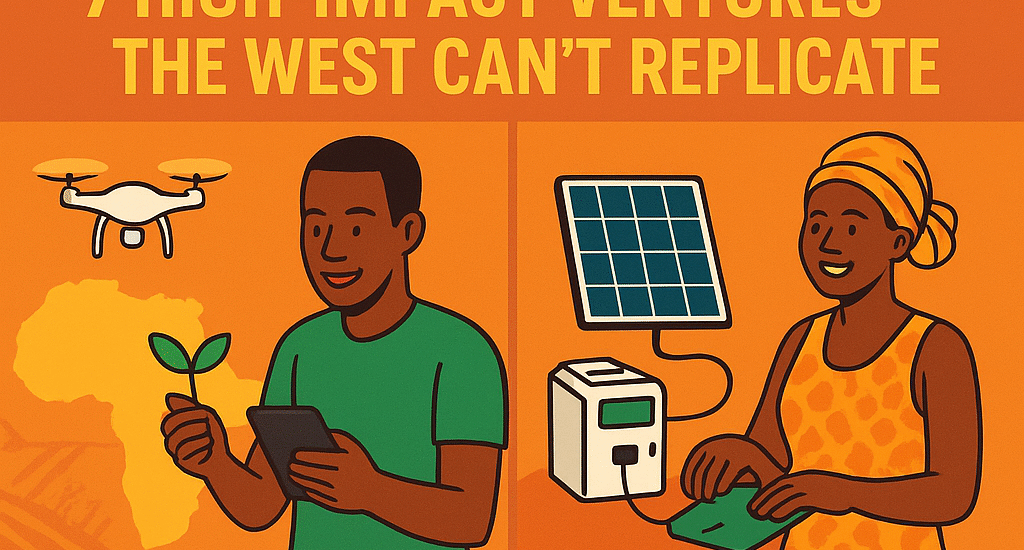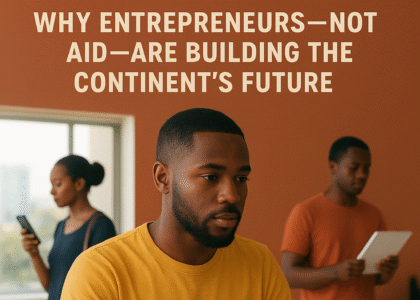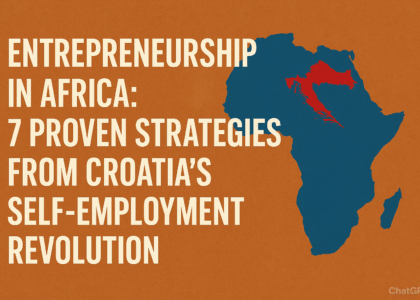—
Africa’s Growth Engine Is Entrepreneurship, Not Aid or Extraction
Africa’s true strength lies in its entrepreneurs, not in its raw materials. Across 54 nations, local innovators build businesses that succeed in environments the West can’t reproduce. These conditions include low connectivity, high creativity, and a wealth of youthful energy.
This is the new African economy, driven by founders who transform soil, sunlight, and stories into scalable global products.
Here are 7 impactful entrepreneurial opportunities based on what Africa possesses and what the West cannot replicate.
—
1. Climate-Smart Indigenous Superfoods
What entrepreneurs can build: Fonio pasta, teff energy bars, tiger-nut milk, baobab smoothies, moringa supplements.
Why it’s uniquely African: These crops thrive in Africa’s dry soils and offer nutritional profiles unlike those in Western agriculture.
The business opportunity: Create “ancestral nutrition” brands, secure EU novel-food approval, and sell through Amazon, Whole Foods, and Shopify D2C.
Example: Ghana’s Moringa King exports $3 million yearly. Imagine 50 such companies across the continent.
—
2. Off-Grid Solar Hardware with “Pay-As-You-Go” Energy
What entrepreneurs can build: $5 solar kits with rent-to-own models backed by mobile money.
Why it’s uniquely African: 85% of un-electrified homes are in Africa, and only Africans understand the last-mile logistics.
The business opportunity: Add smart meters to collect usage data, partner with micro-credit lenders, and monetize energy analytics.
Example: Kenya’s M-KOPA powers 3 million homes; imagine expanding this to the Sahel.
—
3. Afro-Futurist Fashion and Sustainable Textiles
What entrepreneurs can build: 3D-printed Adinkra symbols, bark-cloth streetwear, lab-grown crocodile leather.
Why it’s uniquely African: Heritage-driven design and culturally authentic stories cannot be copied by the West.
The business opportunity: Pair NFT launches with physical twin clothing and uses metaverse fashion weeks to generate global excitement.
Example: South Africa’s Thebe Magugu offers $1,000 jackets in Paris, crafted in Johannesburg.
—
4. DNA-Verified African Cosmetics
What entrepreneurs can build: Shea, marula, and baobab oil serums with blockchain tracking.
Why it’s uniquely African: The fatty-acid makeup of the soil cannot be mimicked in Europe or Asia.
The business opportunity: Develop traceable beauty brands with “from-tree-to-face” narratives.
Example: Ghana’s Yaa’e ships verifiable shea butter to over 12 countries.
—
5. Mobile-First, Low-Bandwidth EdTech Platforms
What entrepreneurs can build: Interactive USSD and voice-learning platforms for feature phones.
Why it’s uniquely African: Silicon Valley doesn’t design for “no data, no keyboard.” Africa has to.
The business opportunity: License to NGOs, telecommunication companies, and government agencies; monetize training for 100 million informal workers.
Example: Côte d’Ivoire’s Etudesk educates over 50,000 students without needing smartphones.
—
6. Drone and AI Logistics for Remote Areas
What entrepreneurs can build: Fixed-wing drones that deliver medical supplies, parts, and parcels to remote airstrips.
Why it’s uniquely African: Open skies, challenging terrain, and communities without road access make Africa an excellent place for drone testing.
The business opportunity: Charge per kilometer, sell carbon credits, and create heat-resistant batteries.
Example: Zipline in Rwanda already leads the world, but Central Africa is ready for similar efforts.
—
7. Story-IP Factories—Afro-Anime and Games
What entrepreneurs can build: Game studios and animation houses that bring Orisha, Shaka, and Queen Amina myths to life.
Why it’s uniquely African: Cultural intellectual property cannot be exported; only Africans can tell African stories authentically.
The business opportunity: License to Netflix, Disney+, Tencent, or sell NFT collectibles and theme park rights.
Example: Nigeria’s Iwájú (Disney+ 2024) received 95% audience approval.
—
Conclusion: Africa’s Economy Will Rise on Founders, Not Foreign Aid
Every challenge is an opportunity for entrepreneurs; every limitation is a competitive advantage. The next leap in Africa’s GDP won’t come from mining or aid but from creators who build what the West can’t.
So, consider:
Which of these ventures could you start, grow, or invest in?
What can you create that the world can’t duplicate?
—
Frequently Asked Questions
Q1. Why is entrepreneurship important for Africa’s economic growth?
It turns Africa’s natural, cultural, and digital resources into lasting wealth. Entrepreneurs create value where aid fosters dependence.
Q2. What industries offer the most potential for African entrepreneurs?
Agritech, renewable energy, EdTech, beauty, logistics, and cultural intellectual property (animation, gaming, fashion).
Q3. How can African startups attract global investment?
By showing scalability, building local resilience, and showcasing genuineness. Africa doesn’t need to copy Silicon Valley; it should capitalize on its unique features.
Q4. What role can governments play?
Streamline business registration, protect intellectual property, and create friendly environments that support local founders, not just foreign investors.





